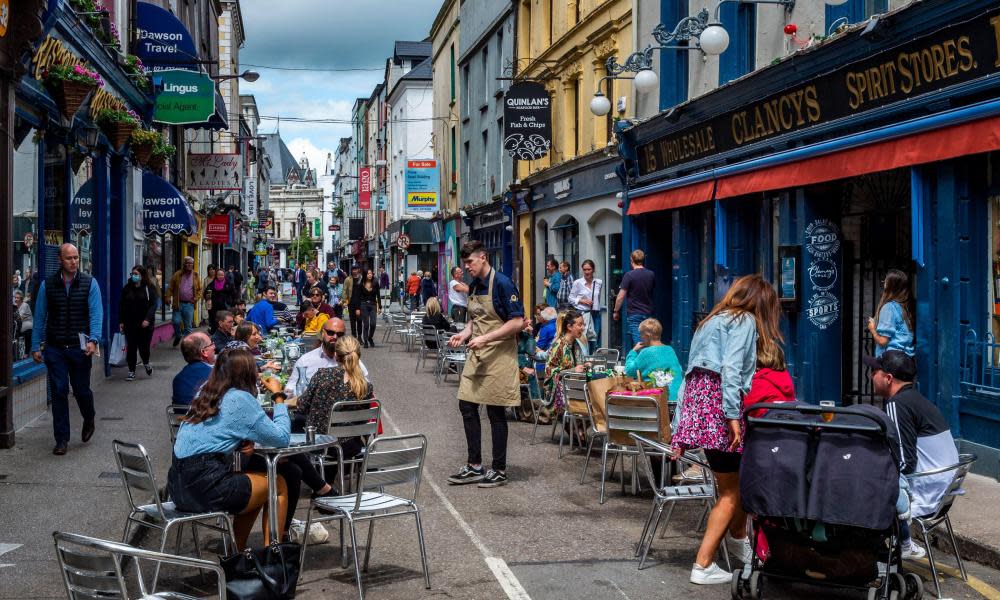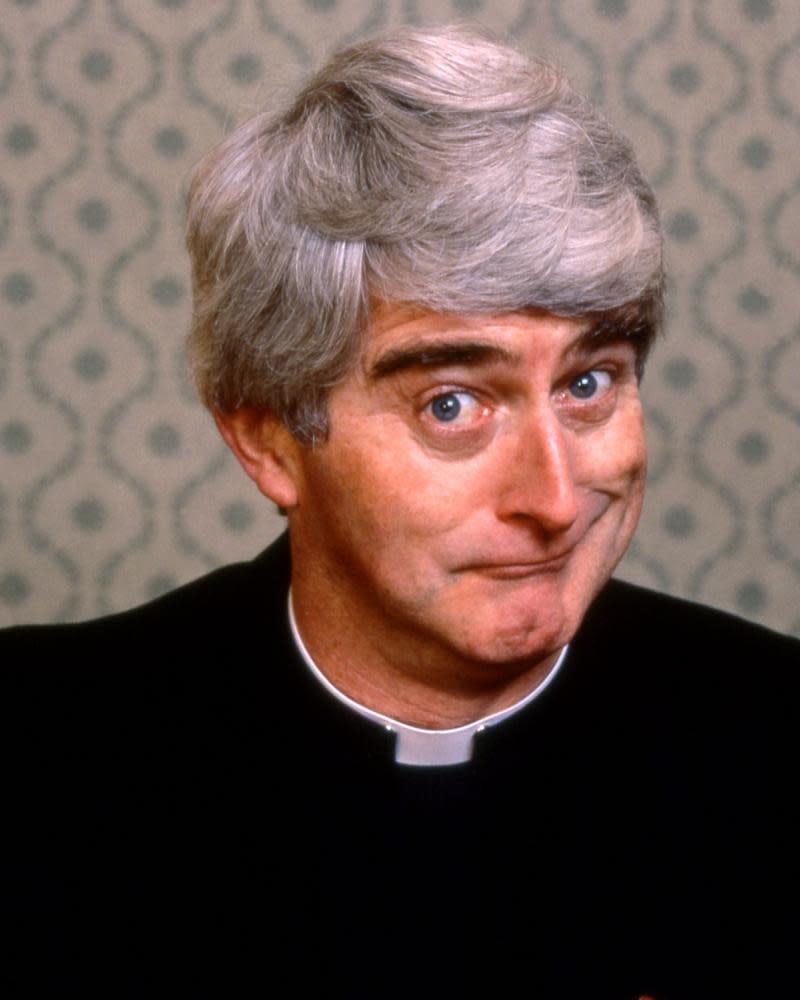Heart meets humour: how Young Offenders put Cork on the map

When the cast and crew of The Young Offenders appeared on the streets of Cork to film scenes for the third series of the TV show, word quickly rippled across the city.
Crowds formed in hope of catching a glimpse of the action, creating a boisterous hubbub right up until the moment cameras started rolling, at which point everyone would shut up and maintain a hush until filming stopped. The denizens of Cork wanted to hear the dialogue, after all. And they didn’t want to do anything to screw up the show.
“It was like a party, then you could hear a pin drop,” said Pat O’Connell, a fishmonger who appears in the show with other traders in the English market. “You take pride in the show. You know they’re going to do it right.”
He was not referring to the central characters. Conor MacSweeney and Jock O’Keeffe, hapless teenagers with atrocious haircuts, bumfluff and a yen for stealing bicycles, seldom do anything right. They bumble through Cork, through life, in one misadventure after another. Other characters are scarcely more competent.
But the makers of the series – a TV comedy now in its third season on RTÉ and BBC Three, spawned by a 2016 feature film of the same name – are clearly on the ball. The film scored 100% on the critic aggregator site Rotten Tomatoes, and the TV show has won a growing fanbase in Ireland and the UK. Disney has snapped up its creator, Peter Foott, to write a comedy.
Variously described as a coming-of-age sitcom and a comic portrait of the adolescent male, The Young Offenders has gifted Cork something it appreciates: attention.
Game of Thrones enticed busloads of tourists to Northern Ireland, Derry Girls and Normal People advertised the respective appeals of Derry and Sligo, and, with less fanfare, The Young Offenders is doing the same for the compact port city that straddles the mouth of the River Lee in Ireland’s south-west, population 210,000.
Fans across the world share their enthusiasm on social media. Before Covid-19 hit, some visited Cork to soak up the vibe and take selfies at locations from the series.
“It showcases the beautiful streetscape,” said Joe Kavanagh, the mayor. “It’s wonderful to have Cork city showcased on international TV. The show portrays Cork in a very natural light.”
Arguably a criminal light, too. Conor and Jock enjoy thieving, or trying to thieve, though material gain seems to matter less than dodging and taunting their would-be Garda nemesis, Sergeant Tony Healy, who flounders in pursuit.
The mayor sees no dent to civic pride. “They’re not hardened criminals, they’re just chancers. Nobody gets injured. The Cork humour shines through very strong. I’ve watched every episode of the show. I watch it again and again.”
Sharon Corcoran, director of economic development and tourism for Cork county, lauded the show’s impact. “We’re pleasantly surprised that it’s been such a success in the UK. The profile of Cork has been raised; it’s shown as lively and entertaining.”
Episodes where Conor and Jack trek into the countryside – excursions that seldom go as planned – display a breathtaking landscape of mountains and beaches, said Corcoran. “We would be very surprised if there wasn’t an economic spin-off from the show.”
For Paul Moynihan, a spokesperson for Cork city council, the characters’ resilience echoes the city’s recovery from economic blows in the 1980s. “Setback after setback, and they just get on with things.”
The Young Offenders is the brainchild of Foott, from Monkstown, County Cork. The discovery of a cocaine haul off the coast of west Cork inspired him to write a screenplay about two teenagers who set off on bikes to find it. Foott shot the film on a shoestring with mostly local actors and crew.
Few anticipated international success, said O’Connell, the fishmonger. “When you look at where it started and see where they ended, it’s been incredible. I have to scratch me head, like. It’s huge, huge. They just had that magic ingredient.”
It’s not poverty porn. Every episode shows something lovely through the grit and grime
Shane Casey, actor
Loosely set amid the council estates in north Cork, storylines revolve around the friendship between Conor, played by Alex Murphy, and Jock, played by Chris Walley. They navigate poverty, boredom, the mysteries of sex, a vindictive school principal and Billy Murphy, a knife-wielding “nut-job”. Jock also has to deal with an abusive, alcoholic father.
Cork’s sing-song accent and slang spices the dialogue, prompting locals to marvel that outsiders can understand it. Might regular viewers master Cork’s singular relationship with the English language? Kavanagh, the mayor, grinned and shook his head. “Never happen.”
Shane Casey, the actor who plays Murphy, said Cork bore a “mild chip on its shoulder” for playing second fiddle to Dublin but fizzed with pride and a sense of difference from the rest of Ireland. “The show features Cork as a character in itself.”
Casey left school at 16 and worked as a decorator before becoming an actor. “I’d be more linked to these characters because I am working class. The Cork I knew growing up was rougher than it is now.”
Coffee bars, gourmet restaurants and legions of tech workers – Apple has its European HQ here – have transformed the city, but grittiness endures, said Casey. “We put a microscope on it but in a humorous way. We won’t get away with anything if it doesn’t have heart.”
Critics of Ireland’s low corporate tax regime argue that Cork’s biggest offender is Apple, which has been accused of dodging billions in tax.
The show avoids poverty porn, he added. “Every episode shows something lovely through the grit and grime … the show is not taking the piss out of Cork.”
And the series garners praise from other quarters. Michael Waldron, assistant curator at the city’s Crawford art gallery, said: “Cork gets a bit of flak for its own sense of self but the show has all the heart and humour of the city: it really has those two things at its core, no matter what shenanigans are going on.” The show tacitly references a beloved depiction of the city from the Crawford collection: an 18th-century work by John Butts, View of Cork from Audley Place, is the exact spot where Conor and Jock regularly sit to muse on life.
Meanwhile, James Windle and Katharina Swirak, criminologists at University College Cork, have credited the sitcom with astute observations about young people’s socio-economic exclusion since the Celtic Tiger’s collapse in the late 2000s. “This is in stark contrast with common political and media depictions portraying young offenders as one-dimensional violent ‘scumbags’ or entrepreneurial predators,” they wrote last month.
The shows that bought tourists flocking to the island of Ireland

Craggy Island is fictional but Father Ted, which some critics rank second only to Fawlty Towers in the list of TV comedy greats, draws fans to Inishmore, an island off County Galway, for the annual Friends of Ted festival, or Ted Fest.
Game of Thrones brings tens of thousands of fans to locations in Northern Ireland, where most of the saga was filmed, generating an estimated £50m in 2018 alone.
Tourism Ireland made a behind-the-scenes film about Normal People, the TV version of Sally Rooney’s novel, to lure fans to Sligo. Derry is planning Derry Girls tours and other attractions linked to the Channel 4 show.
Ballykissangel, a Sunday-night BBC drama, came off air in 2001 but the official Visit Wicklow website still mentions the village of Avoca as a central location for the series.


